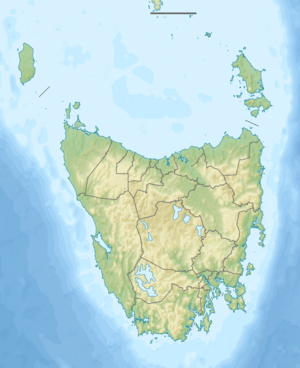Edgar Dam
The Edgar Dam is an earthfill embankment saddle dam without a spillway, located offstream in the South West region of Tasmania, Australia.
| Edgar Dam | |
|---|---|
 Location of the Edgar Dam in Tasmania | |
| Country | Australia |
| Location | South West Tasmania |
| Coordinates | 43°01′48″S 146°20′24″E |
| Purpose | Power |
| Status | Operational |
| Opening date | 1973 |
| Owner(s) | Hydro Tasmania |
| Dam and spillways | |
| Type of dam | Embankment dam |
| Impounds | Off stream |
| Height | 17 metres (56 ft) |
| Length | 460 metres (1,510 ft) |
| Dam volume | 96×103 m3 (3.4×106 cu ft) |
| Spillways | 0 |
| Reservoir | |
| Creates | Lake Pedder |
| Total capacity | 2,937,930 ML (103,752×106 cu ft) |
| Catchment area | 734 km2 (283 sq mi) |
| Surface area | 241 km2 (93 sq mi) |
| Maximum water depth | 43 m (141 ft) |
| Website hydro | |
The impounded reservoir, also formed with the Scotts Peak Dam and the Serpentine Dam, is called Lake Pedder which flooded Lake Edgar, a naturally forming fault scarp pond. The dam was constructed in 1973 by the Hydro Electric Corporation (TAS) as part of the Gordon River Power Development Scheme for the purpose of generating hydro-electric power via the Gordon Power Station. Water from Lake Pedder is diverted to Lake Gordon (formed by the Gordon Dam) via the McPartlan Pass Canal.[1]
Location and features
The Edgar Dam, together with the Scotts Peak Dam and the Serpentine Dam, are three major dams that form the headwaters for the Gordon River Power Development Scheme. The dam is located near Lake Pedder's most easterly point[2] in the upper reaches of the Huon River where the river descends from the Marsden Range and descends into what is now known as the Huon Basin. Also at the southern end of the Lake Pedder, the Scotts Peak Dam impounds the Huon River. At the northwestern end of the lake is impounded by the Serpentine Dam across the Serpentine River. The water in Lake Pedder provides around 40% of the water used in the Gordon Power Station. The water flows to Lake Gordon via McPartlan Canal.[1] Water from Lake Gordon then exits through the Gordon Dam.
The Edgar Dam wall, constructed with 96 thousand cubic metres (3.4×106 cu ft) of earth core, is 17 metres (56 ft) high and 460 metres (1,510 ft) long. At 100% capacity the dam wall holds back 2,937,930 megalitres (103,752×106 cu ft) of water. The surface area of Lake Pedder is 241,330 hectares (596,300 acres) and the catchment area is 734 square kilometres (283 sq mi). The dam wall does not have a spillway.[3]
The dam draws its name from the flooded Lake Edgar.
Lake Edgar Fault
The Lake Edgar Fault is a 30-kilometre (19 mi) long north-south trending scarp that occurs within the boundary of the Southwest National Park. The scarp traverses the button grass of the Huon Plains and is notable because faulting resulted in the defeat of westerly flowing drainage and the consequent formation of the fault-bound sag pond of Lake Edgar.[4] In spite of a tremor measuring 3.2 on the Richter magnitude scale in January 2001 near the Lake Edgar fault, which runs adjacent to the Edgar Dam, the ability of the dam to cope with stresses associated with seismic activity. .[5][6][7][8][9]
Hydro Tasmania is confident that the eventuality of the Edgar Dam being destroyed by an earthquake is an extremely remote possibility.
See also
- List of dams in Tasmania
References
- "Gordon - Pedder". Energy: Our power stations. Hydro Tasmania. Retrieved 21 June 2015.
- "Edgar Dam camp ground". Community. Hydro Tasmania. 2015. Archived from the original on 1 July 2015. Retrieved 29 June 2015.
- "Register of Large Dams in Australia" (Excel (requires download)). Dams information. Australian National Committee on Large Dams. 2012. Retrieved 28 June 2015.
- "Lake Edgar Earthquake" (PDF). Geoscience Australia. 22 June 2004. Retrieved 28 June 2015.
- Taylor, Sam (April 2002). "Dam failure" (PDF). Reflections. The Lake Pedder Restoration Committee (9): 7. Archived from the original (PDF) on 26 March 2016. Retrieved 28 June 2015.
- "Earthquakes". Mineral Resources Tasmania, Department of State Growth. Government of Tasmania. Retrieved 29 June 2015.
- McCue, K; Boreham, B; van Dissen, R; Gibson, G; Jensen, V; McKavanagh, B (1996), A paleoseismology case study: the Lake Edgar Fault Scarp in Tasmania, Geological Society of Australia, retrieved 30 October 2017
- McCue, K; Van Dissen, R; Gibson, G; Jensen, V; Boreham, B (2003), The Lake Edgar Fault: an active fault in Southwestern Tasmania, Australia, with repeated displacement in the Quaternary, Istituto Nazionale di Geofisics e Vulcanologia, retrieved 30 October 2017
- Clark, D; Cupper, M; Sandiford, M; Kiernan, K (2011), Style and timing of late Quaternary faulting on the Lake Edgar fault, southwest Tasmania, Australia: Implications for hazard assessment in intracratonic areas, retrieved 30 October 2017
Further reading
- Reid, Vern (1976) Edgar Dam B&W photo between p. 248 and p249 (not indexed) of the Tasmanian Year Book No.10 1976. Australian Bureau of Statistics Tasmanian Office ISSN 0082-2116
- Tasmania. Hydro-Electric Commission. Survey Section; Tasmania. Department of Lands and Surveys (December 1967). Gordon River power development Stage 1 (Map). Hobart: Hydro-Electric Commission.